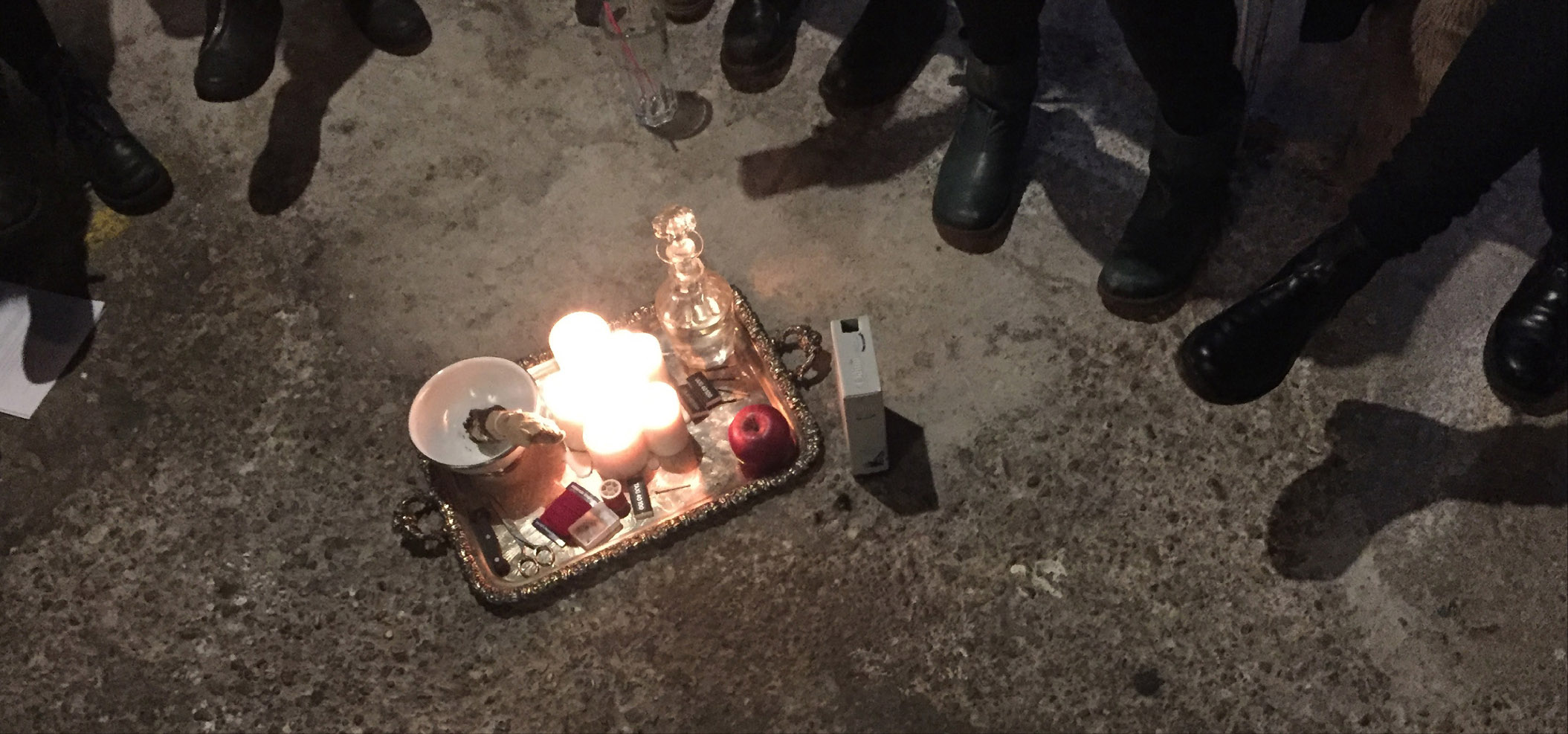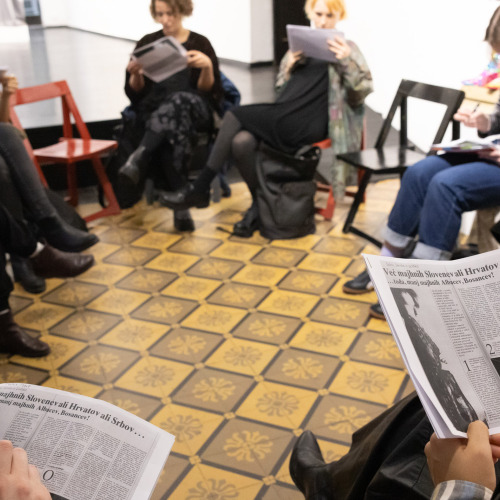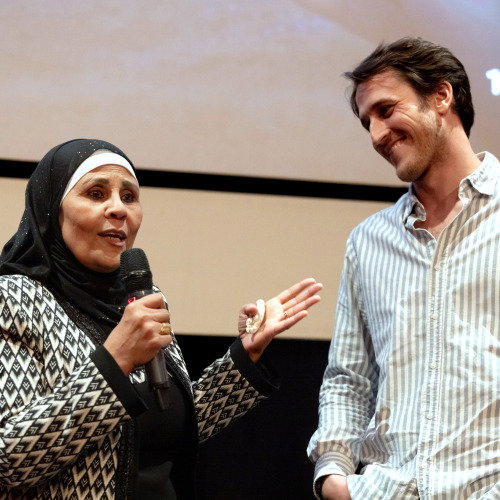

Curating With Care
“Last year, the City of Women team attended a presentation of the book Curating with Care, which was accompanied by a discussion about curating as a practice of care work. Some time was also dedicated to the international platform n*a*i*l*s* hacks*facts*fictions* and its interdisciplinary exploration, which has already been presented in Ljubljana at the 26th edition of the City of Women festival.”
In March 2023, Routledge published a volume titled Curating with Care, edited by Elke Krasny and Lara Perr. In one of the chapters, Katja Kobolt, Petja Grafenauer, and Brigita Miloš look back on the collective way of curating that they practised while working on the n*a*i*l*s* hacks*facts*fictions* project, organised by the the City of Women and the European project BePart.Together with this contribution, the book presents an important reflection on curating as a form of care work, since the work of a curator includes keeping art spaces and programmes open as well as archiving past practices, through which the future can be contemplated.
In an interview, also constituting part of Curating with Care, Lauren Crai presents a definition of curating as an ethical practice inseparably connected to the practice of care. In this context, caring means more than just taking care of the historical archive of a space, festival, or community, but also caring for the feminist decolonised curating method, with which knowledge can be passed on to future generations. This is especially emphasised in the chapter by Françoise Vergès, in which she makes the connection between cultural work and decolonial feminism. Curating is, of course, a practice – decolonial feminism is practised through exhibitions and events. Possibly the most important editions of the City of Women festival that dealt specifically with the decolonial feminist approach to festival curation were the 7th and 28th editions. For the 7the edition, taking place in 2001, exclusively artists of colour from different continents were invited, and at the 28th edition, the exhibition The South in Us (Jug v nas) raised the questions of both internalised Western colonial positions towards Balkan countries and the self-identification of these countries with the West combined with the coloniality its inhabitants adhere to regardless of the, for example, Yugoslav anti-colonial position and participation in the Non-Aligned Movement
The publication of Curating with Care introduces some important examples of curating practices and community museums. Helen Kaplinsky analises the work of Danielle Brathwaite Shirley, who is fighting against the erasure of Black trans lives from cultural history with her project We are Here and by founding community museums like Iaiá Procópia and Muquifu in Brazil. This practice functions as an answer to classical museum installations that operate as hegemonic memory repositories. Avtonomni Akadimia in Athens works in a similar way, fusing Western political philosophy, the theory of media, and indigenous forms of knowledge, which is analysed in the book by Joulia Strauss. Katja Kobolt, Petja Grafenauer, and Brigita Miloš also adopt the point of view of practising care in their contribution, titled The Platform of Care, in which they review the collective project n*a*i*l*s* hacks*facts*fictions*, which has also produced the publication Corneous Stories: Cosmetics in Society and Time (Roževina zgodovine: Kozmetika v družbi in času), available in our library.
The roles of curator and author as carer merge; it is caring for the preservation of non-hierarchical structures within creative processes, caring for communal spaces, caring for marginalised communities, nature, animals, fellow humans (within creative processes), history (spreading awareness about its influence on the present), the material and immaterial dimensions of archives (ideological suppositions), the dead (their heritage and remains). This way of working means also that thinking and caring merge, as editor Elke Krasny writes in her contribution to the book. She proposes a feminism of care, where care is understood to be a reciprocal practice based on mutual solidarity and aid. This approach requires curators to exercise constant self-reflection, questioning the context, power relations, race, class, and genders.
The work of curating care, along with artistic creation itself, approaches the concept of reproductive care and domestic labour, as pointed out by Katja Praznik in her book Art Work (Delo umetnosti). Cultural workers – curators, editors, critics, and also artists – are usually in precarious positions, adjusting to changing conditions, and unprotected. Just like domestic labour was attributed to women with the essentialist reasoning (that it is inherently female), a cultural worker or artist is often understood to be working for her own pleasure, inner urge, or unstoppable desire. “The problem of essentializing the work tied to a particular kind of subjectivity and fed by the ideology of artistic work and creativity is a key mechanism that causes the invisibility of art as a form of labour” (Katja Praznik, p. 66). This aspect, connecting feminist curating practice to care work, is also a necessary step in thinking about curatorial work. Art and curation provide no added value and, as such, come close to invisible reproductive labour, seemingly redundant for the accumulation of capital. Precisely within this, however, we can find political potential for social change. Our autonomous creative spaces need not be little gardens to be cultivated by each individual, but can, by connecting and caring for each other, become a place that offers an alternative and a space for change, even if change occurs at micro-levels.
The City of Women festival was created as a response to the repatriarchalisation of Slovenian society after the transition into capitalism, stemming from the need to reinvestigate contemporary art, which inherited the artistic practices of the past as dictated by white, cis men. The City of Women thus gives space to FLINTA artists and focuses on non-hierarchical, sister artistic practices, curating the programme with this in mind, which for us means taking a feminist future into consideration, while simultaneously keeping the contemporary and the past before our eyes at all times – we care about our association’s history and how it merges in gallery spaces and event venues.
Sources:
Praznik, Katja. Delo umetnosti. Nevidno delo in zapuščina jugoslovanskega socializma. Ljubljana: Maska, 2023.
Curating with Care. Edited by Krasny, Elke; Perry, Lara. London: Routledge, 2023.




